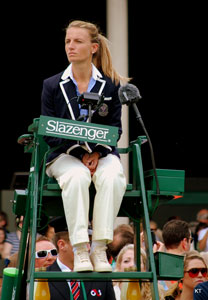Employers and Universities: Work with us?

How to become a Wimbledon umpire
Wimbledon is in full swing and with the possibility of a British win in both the women’s and the men’s championships, tennis fever has well and truly taken hold here at Success at School!
In the true spirit of Wimbledon, we thought we’d take a look at what you need to do to make it as an umpire in those very special two weeks down at the All England Club.
What is a tennis umpire?
There are two types of tennis umpires – line umpires (often called “line judges”) and chair umpires.

While line umpires call the ball in or out, chair umpires are the guys in charge – the ultimate authority on the tennis court. In a nutshell, they make sure the rules are being followed and that the game is being conducted in a spirit of fair play. Chair umpires:
- Conduct the coin toss to decide which player chooses who serves first.
- Announce the scores.
- Have the power to overrule line judges’ calls.
- Time players between points, games and sets.
You have to be 16 to apply to become a line umpire and once qualified you can progress quickly. Sagar Kashyap from India was only 22 when he first took up the seat as chair umpire at Wimbledon.
You don’t generally get paid to umpire at Wimbledon, but you’ll usually have your expenses paid. It’s more of a privilege than a job!
What skills do you need?

To be a line umpire, you’ll need:
- Perfect 20/20 vision (it’s fine if you wear glasses).
- The ability to shout really loudly (although anyone who’s seen Wimbledon will know that perfect enunciation isn’t a requirement).
- Good reaction time – the fastest serve at Wimbledon 2016 was Canadian Milos Raonic at 147mph (it was during the men’s final, which Andy Murray won!). You shouldn’t be too eager, you don’t want to call the ball before it lands.
- The ability to stay calm – sometimes players get a little… heated. “It is important not to make the situation worse - even if you know you are in the right,” says umpire (and priest) Father Paul Arinze.
- Excellent concentration – Emily McGuiness says umpiring is tantamount to working at a computer all day.
- Able to understand swear words in several different languages – whether it’s in French, Russian or English, swearing is a rules violation. Umpires have to be able to recognise bad language in all the major languages!
How do you qualify as an umpire?
Before becoming a chair umpire, you have to work as a line umpire. Anyone over the age of 16 can apply to the Lawn Tennis Association (LTA) to become a line umpire. If your application is accepted, you’ll attend a one-day training course, which combines a mixture of classroom learning and on-court action. You’ll be assessed on the day, and if you pass, you can work as a line judge!
Experienced line judges can apply to the chair umpire course. The course lasts two days and includes an exam at the end. If you pass, you’re qualified to work as a chair umpire – you need to umpire 30 days a year to keep your “accreditation”.
You don’t need to be a tennis player to become an umpire. “Some of the best umpires have never played before,” says Wimbledon umpire Bernadette Halton. “If you're assertive and make bold, confident decisions the players will feed off that.”
Cool Wimbedon umpiring facts
- In 2016, there were 40 chair umpires.
- Umpires usually chair 2 matches per day.
- Umpires can ask players to change if they don’t meet the strict Wimbledon all-white dress code. In 2013, Roger Federer was told to change his shoes before the next match because they had orange soles.
Got sport on the brain? Check out our guide to sports apprenticeships to see if you could begin your career straight from school.
Image credits
Coin toss Flickr, Eva Asderaki Wikimedia Commons
